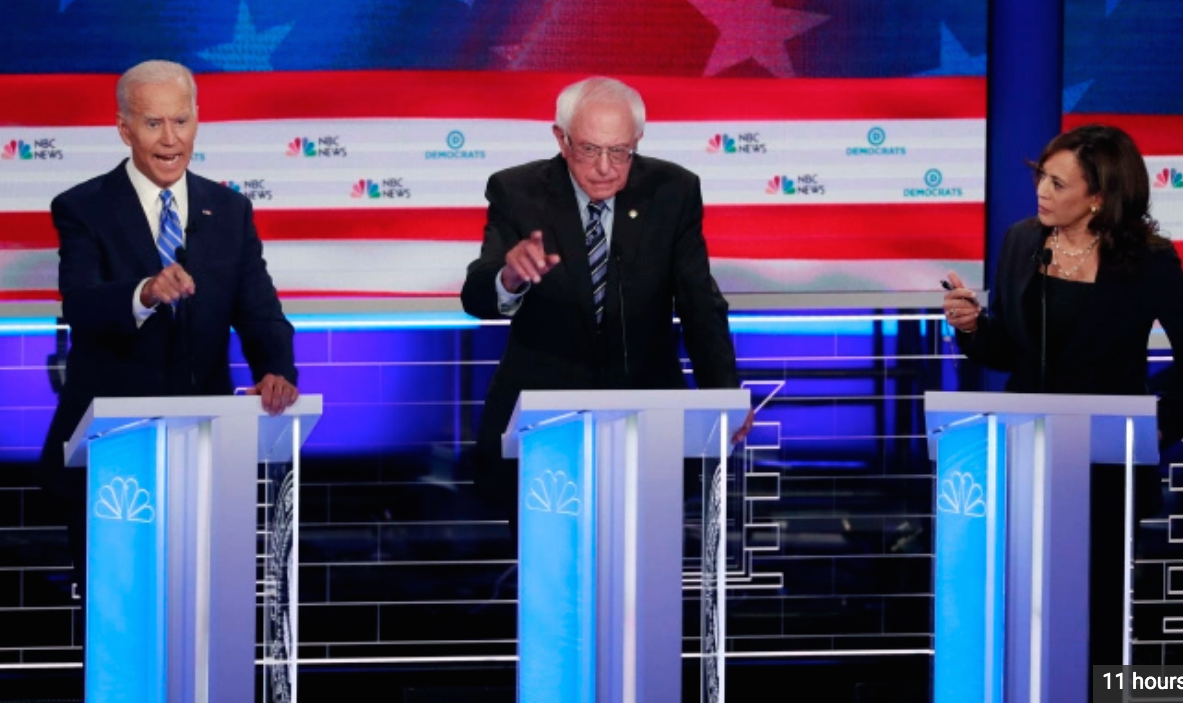Democrats Move Further Left On Gun-Grabbing In 2020 Debate - 5 minutes read
 Democrats Move Further Left On Gun-Grabbing In 2020 Debate
Democrats Move Further Left On Gun-Grabbing In 2020 DebateDemocratic candidates collectively came out for more gun control in the first debates of the 2020 election cycle, seemingly trying to one-up each other with stricter gun-grabbing policy proposals.
Thanks to gun control activists centered around mass shootings, like March For Our Lives, even candidates who previously held conservative or moderate positions on Second Amendment rights—like Bernie Sanders, Joe Biden, and Kirsten Gillibrand—seemed to be pulled left as they unveiled their new gun control talking points.
Vice President Joe Biden proposed banning the sale of any firearm that does not feature biometric locks, which are often referred to as “smart guns.”
“We should have smart guns,” he said in Thursday night’s debate. “No gun should be able to be sold unless your biometric measure could pull that trigger. It’s within our right to do that. We can do that. Our enemy is the gun manufacturers, not the NRA.”
There are no guns with said biometric locks currently for sale on the American market. Biden’s policy would effectively outlaw the sale of every firearm currently available in U.S. stores.
California Congressman Eric Swalwell, who has previously threatened to nuke Americans who don’t want to turn their guns over to the government, advocated for his proposal for a mandatory national ban and buyback of “military-style semiautomatic assault weapons.” That would mean confiscating over 15 million guns.
“Keep your pistols, keep your rifles, keep your shotguns, but we can take the most dangerous weapons from the most dangerous people,” Swalwell said.
Senator Kamala Harris said Swalwell’s idea was “great,” but threatened to take executive action on gun control because Congress lacks “the courage to act.”
“I will give the United States Congress 100 days to pull their act together, bring all these good ideas together and put a bill on my desk for signature,” she said. “And if they do not, I will take executive action, and I will put in place the most comprehensive background check policy we’ve had.”
Senator Bernie Sanders was hit on his gun control record in the 2016 Democratic primaries from opponents Hillary Clinton and Martin O’Malley, as Vox reported.
Since then, and likely in anticipation of 2020, Sanders has upped his efforts to come out for stricter gun laws including co-sponsoring recent bills in the Senate on gun violence. On Thursday night, Sanders said the United States is experiencing “a gun crisis,” and called for universal background checks. He added that he would “ban the sale and distribution” of assault weapons, saying they are weapons for the military.
Swalwell attacked Sanders, pressing him to answer whether he would buy guns back, the Vermont Senator said, “If the government wants to do that, if the people want to bring them back, yes.”
Senator Kirsten Gillibrand often brags that she is able to win over voters in red districts, citing that she obtained highest vote threshold of 72 percent in the state of New York. When she first entered politics 14 years ago, she had an A+ rating from the NRA, but her position on the Second Amendment has dramatically shifted since.
Senator Cory Booker touted his plan to require a license to buy and own a firearm, and South Bend, Indiana, Mayor Pete Buttigieg, a veteran of the Afghanistan war, relied on his experience to inform voters, “that there are weapons that have absolutely no place in American cities or neighborhoods in peacetime. Ever.”
Of course, these policy positions did not evolve spontaneously. Candidates are responding to the issues Democratic voters say they care about. A Morning Consult poll of what debate topics voters wanted to hear about found that 62 percent of voters said gun policy was “very important.”
Source: Thefederalist.com
Powered by NewsAPI.org
Keywords:
Democratic Party (United States) • Debate • Democratic Party (United States) • Gun control • First Amendment to the United States Constitution • Debate • United States presidential election, 2020 • Gun control • Activism • Demonstration (protest) • Candidate • Conservatism • Moderate • Second Amendment to the United States Constitution • Bernie Sanders • Joe Biden • Kirsten Gillibrand • Left-wing politics • Gun control • Joe Biden • Firearm • Biometrics • Biometrics • National Rifle Association • Biometrics • United States • Joe Biden • Firearm • California • United States House of Representatives • Eric Swalwell • Nuclear weapon • Semi-automatic firearm • Assault weapon • Artillery • Handgun • Rifle • Shotgun • Swalwell • Executive Action (film) • Gun control • United States Congress • Executive Action (film) • Background check • Bernie Sanders • Gun control • Democratic Party presidential primaries, 2016 • Hillary Clinton • Martin O'Malley • Vox (website) • Bernie Sanders • Overview of gun laws by nation • United States Senate • Gun violence • United States • Universal background check • Assault weapon • United States Armed Forces • Swalwell • Bernie Sanders • Vermont • Government • Kirsten Gillibrand • Voting • Voting • Election threshold • Politics • National Rifle Association • Second Amendment to the United States Constitution • United States Senate • Cory Booker • Firearm • South Bend, Indiana • Mayor of New York City • Pete Buttigieg • War in Afghanistan (2001–2014) • Policy • Democracy • Morning Consult • Opinion poll • Voting • Voting •